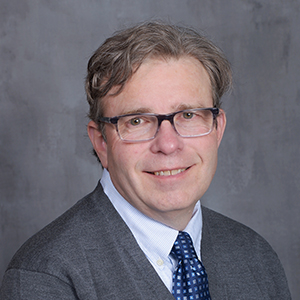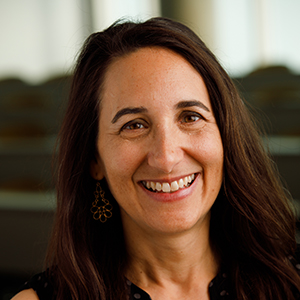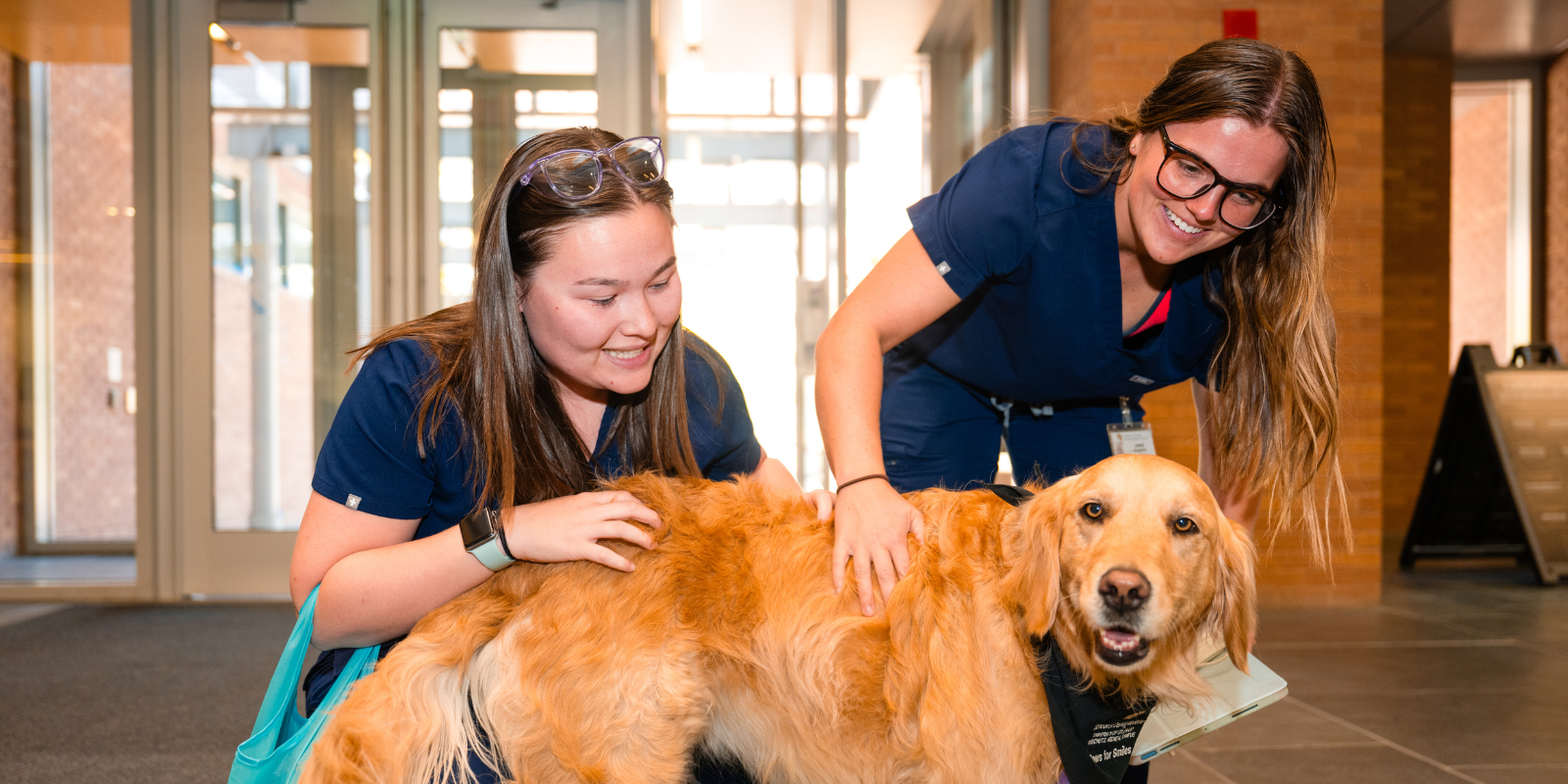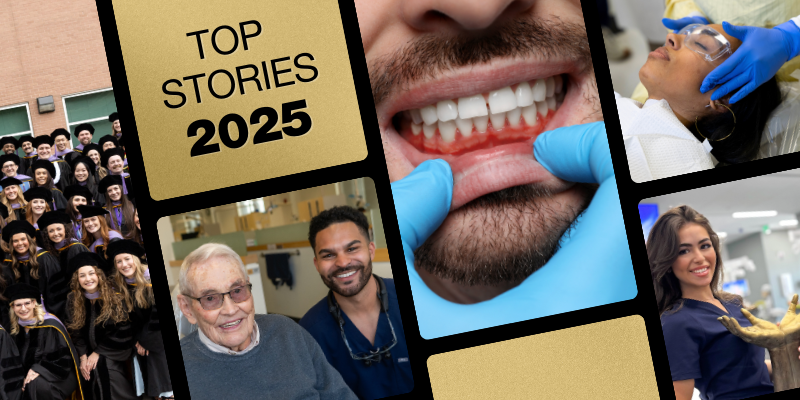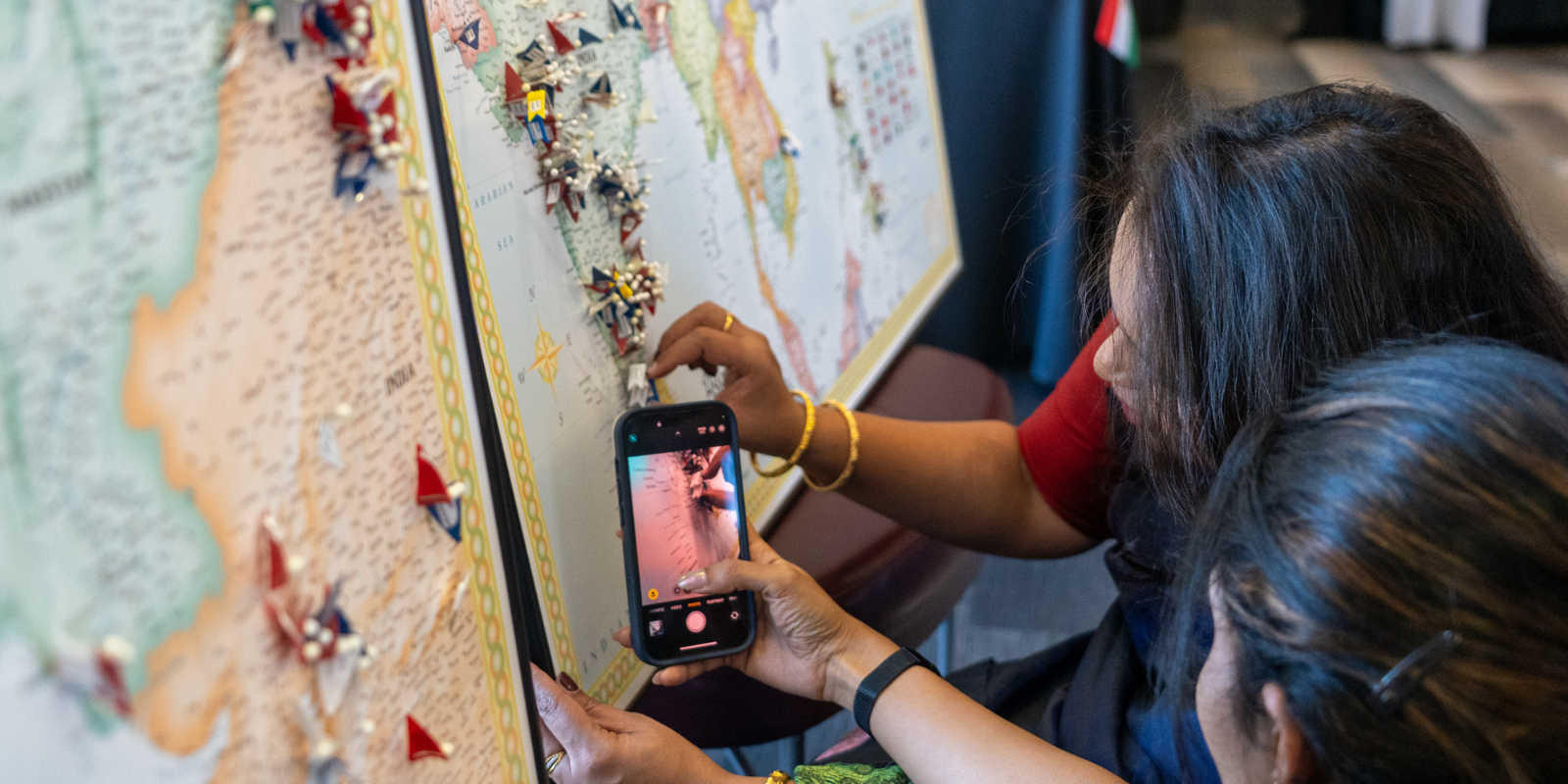While some took to the slopes for spring break, six dental students from the University of Colorado School of Dental Medicine (CU SDM) embarked on transformative service-learning trips to Brazil and Honduras. The school’s new Global Health Initiatives aim to teach students about oral health abroad, the burden of oral health diseases and access to dental care.
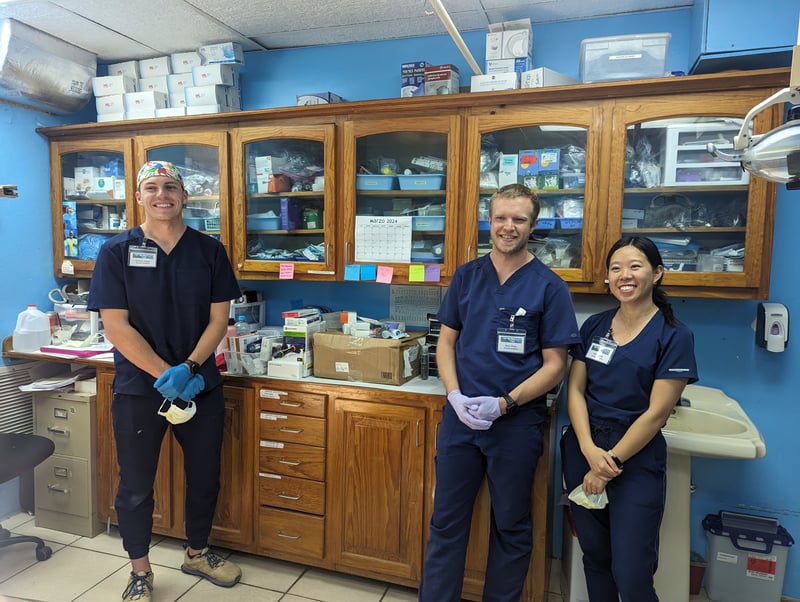
Zach Zylstra (left), Ryan Utsey (center) and Melina Tseng (right) learn about oral healthcare systems in Honduras at Clinica Esperanza Roatán. |
In Honduras, third-year dental students Melina Tseng, Ryan Utsey and Zach Zylstra were welcomed with a music festival and fire show on the beach: Hundreds of people were there for the largest fundraiser of the year to support Clinica Esperanza Roatán, a nonprofit community health center that serves 38,000 people annually with just 22 full-time staff members. “The local community rallies around this clinic,” said Utsey. “It's not just for those who can't afford care; everyone on the island can go there, so everyone tries to support their mission.”
The students, accompanied by CU SDM faculty and alumni John Raabe, DDS ’90, and Cori Morris, DDS ’21, spent time at Clinica Esperanza, a local elementary school and in a remote village. They experienced first-hand what healthcare looks like in a vastly different part of the world from what they know back home.
“For many of the kids we saw, this was their first interaction with a dentist. I saw it as an opportunity to help build trust instead of the unnecessary trauma often associated with dentists that has affected so many generations, up until now,” shared Utsey.
The team provided dental screenings, fluoride varnish and oral hygiene instructions to more than 100 children between the village and the elementary school. Utsey said it was difficult to see the extent of the decay in some of the kids, especially at such young ages.
He said, “This experience confirmed that dentistry is the right calling for me. I know that I'm able to make a difference in people’s lives with the skills I'm learning here at CU.”
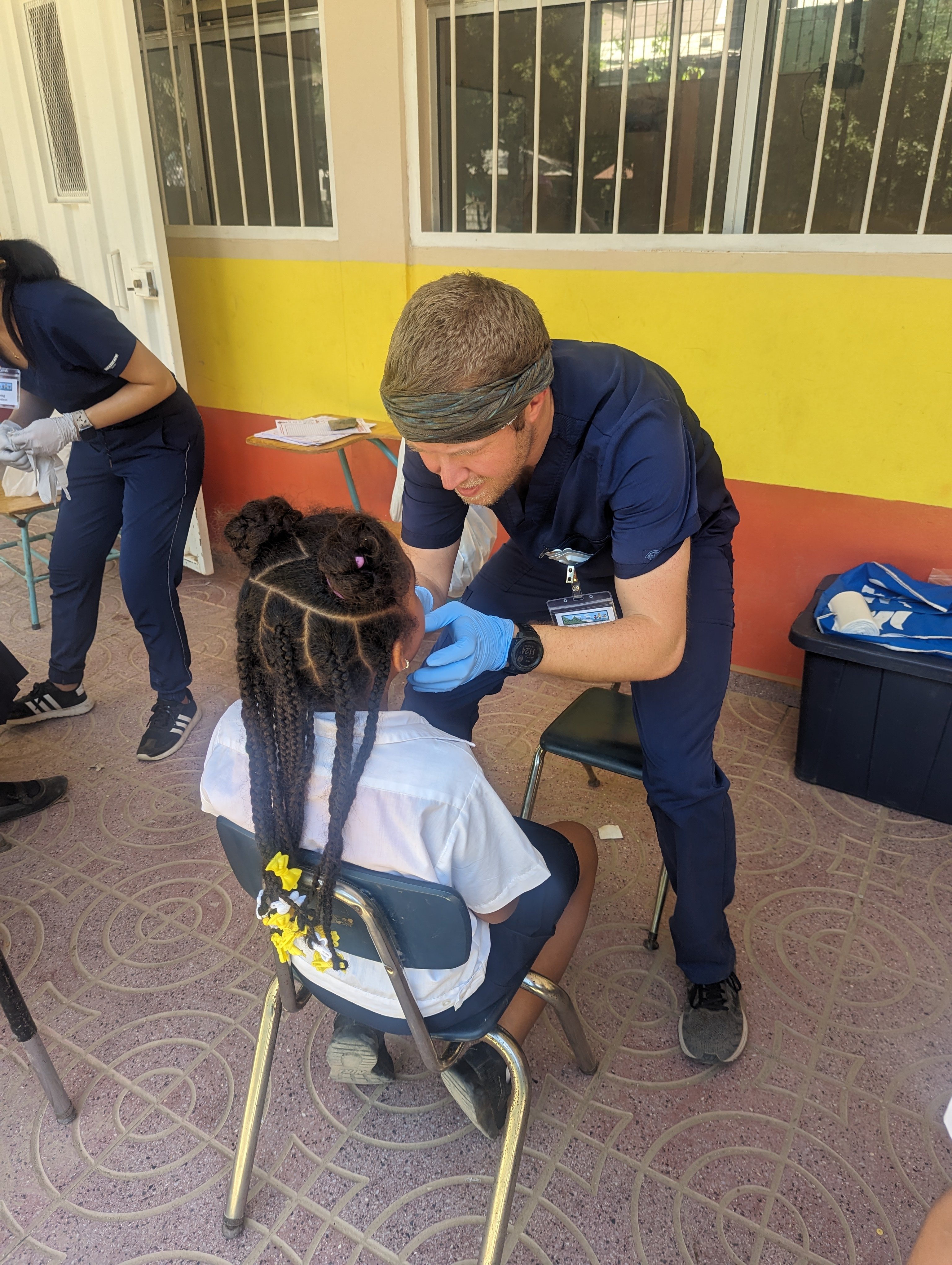
At an elementary school in Roatán, Honduras, Ryan Utsey examines a student and provides fluoride varnish to help prevent tooth decay. |
Fostering Confidence in Patient Care
In addition to providing preventative services for local youth, Tseng, Utsey and Zylstra also had the opportunity to perform dental procedures on patients of all ages at Clinica Esperanza. As third-year students, they have been seeing patients with faculty supervision in the CU Dental clinics for just over a year.
Zylstra said, “This experience bolstered my confidence in being able to assess and treatment plan on the spot. With every patient I saw, it was up to me to figure out how I could help them within about five minutes of meeting them, and with no information other than their name.” He emphasized that there were many differences between Clinica Esperanza and the CU Dental clinics. “We had to do the best we could with less resources than we’re used to.”
Morris said the highlight of the trip for her was seeing the students gain confidence and become more proficient throughout the week: “By the last day, I felt like they knew what they were doing, and they were doing it well. My hope is that the students gained a better understanding of how to treat patients from different backgrounds and cultures.” Morris owns a family dentistry practice in Littleton, Colorado, and is a preceptor for the CU SDM Advanced Clinical Training and Service (ACTS) Program at the Worthmore Clinic in Aurora, serving refugees from around the world. She and Raabe have worked with Clinica Esperanza through the Denver Cherry Creek Rotary Club and were instrumental in launching this initiative with the CU SDM.
Broadening Public Health Perspectives
More than 4,000 miles away in Vitória, Brazil, third-year students Abel Gaytan, Cassidy Hoyt and Jennifer Ringsdorf were learning about the public healthcare systems and dental education structures alongside other dental students at the Universidade Federal do Espírito Santo (UFES).
The Brazil service-learning trip was led by Bruce Dye, DDS, MPH, CU SDM professor and chair of the Department of Community Dentistry and Population Health. He explained that the Honduras trip is more about direct clinical care systems, while the Brazil trip is meant to teach broader global health concepts, differences in public health systems and training, and provide opportunities for observational learning.
“This trip provided a wonderful opportunity for students to observe and learn how dental education is similar and different compared to their experiences at the University of Colorado,” Dye said. “Additionally, witnessing how dental care is integrated into Brazil’s national healthcare system provides valuable insight into how health systems operate differently to ensure people receive care.”
The team was also able to see how a nonprofit clinic engages with the surrounding community to provide a variety of high-quality healthcare services, including dental care, which is similar to how a Federally Qualified Health Center operates in the United States.
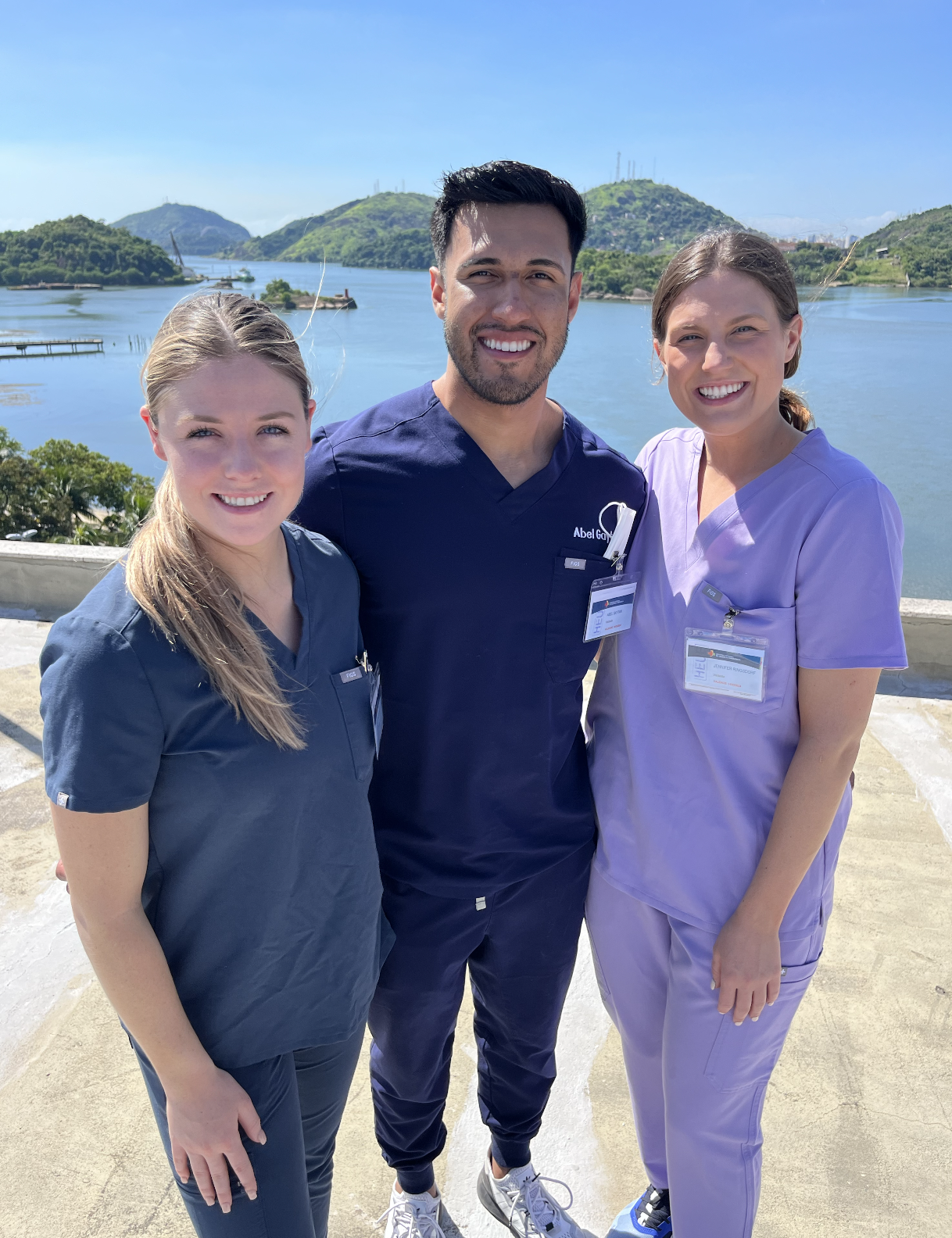
Cassidy Hoyt (left), Abel Gaytan (center) and Jennifer Ringsdorf (right) capture the view outside the clinic after a day of observational learning in Vitória, Brazil. |
Ringsdorf recalled the most unique observational experience she and her classmates were fortunate enough to witness: “We got to observe some hospital-based dentistry that we wouldn’t normally get to see in our dental training. In the surgery we observed, doctors took a bone graft from the hip to use in jaw reconstruction, which was amazing. That was my favorite day because it was so unexpected.”
Ringsdorf is part of the Doctor of Dental Surgery (DDS) and Master of Public Health (MPH) Dual Degree Program, which gives dental students the unique opportunity to earn the MPH degree asynchronously. Because global health is not a recognized specialty for dentists, those interested in global concepts can choose to study public health and expand from there.
“This week put a lot into perspective for me, personally,” said Ringsdorf. “I feel very thankful to be earning my degrees here at the Anschutz Medical Campus, and to practice dentistry here in the U.S.”
Hoyt was most thankful for the people she met in Brazil: “While immersing ourselves in their practices and methodologies, we also formed lifelong connections with fellow students and doctors, creating a strong network of friends and professional contacts. These connections not only enriched our experience but also provided valuable networking opportunities for future collaborations and learning exchanges in the field of global health.”
She said this experience broadened her perspective and provided valuable lessons in understanding the complexities of healthcare delivery in different cultural contexts.
Get Involved: Global Oral Health Initiatives at CU Dental
“Anyone who is interested in global oral health can find a way to get involved,” said Morris. “You have to be service-minded and find opportunities to give back, to network with dentists from other countries and begin making those connections globally.”
In addition to these international service-learning trips for dental students, the CU SDM offers two new didactic courses: Introduction to Global Health, Policy, Humanitarianism, and Introduction to One Health and Oral Health. The first is a foundational course taught by Clinical Associate Professor Elizabeth Shick, DDS, MPH. Shick was recently elected to serve on the FDI World Dental Federation (FDI) Public Health Committee, which is dedicated to the improvement of oral health and general health in disadvantaged communities. She was also chosen to be a member of the 2024 American Dental Association (ADA) Delegation to the FDI World Dental Congress annual session. With this designation and a grant from the ADA, she helped create a self-paced online course, The Challenge of Oral Disease: A Call for Global Action, which will be embedded into the CU SDM course and students will receive a certificate of completion.
“This is the first time the school has been able to offer global health activities since 2019,” said Shick. Prior to the coronavirus pandemic, she led the school’s Guatemala Smiles global health program. Both Tseng and Zylstra mentioned that program as a competitive factor in their decision to apply to CU.
Tseng, who was born in Argentina with parents from Taiwan, has always had an affinity for world travel. She earned her U.S. citizenship through military service—four years in the Army—then applied to dental school. She said, “I’m just so happy I got to go on this trip, finally. I love traveling, meeting new people and new experiences.”
Zylstra grew up in a family that instilled global service at a young age, going on a lot of service trips both domestically and abroad. He said, “This experience centered my love for dentistry and particularly community health. I’ve come to realize that dentistry has a lot more to offer than school can ever teach you.”
For students interested in future service-learning trips, email sdm-globalhealth@cuanschutz.edu. Visit the Global Health Initiatives webpage for eligibility information and more details. For faculty and alumni interested in supporting these initiatives, the CU SDM Global Health Giving Fund helps offset students’ costs for airfare, lodging and travel insurance. (Under "gift designation" select "write in" and type "CU Dental Global Health Fund.")
Photo at top (left to right): Melina Tseng, John Raabe, DDS '90, Ryan Utsey and Zach Zylstra.

